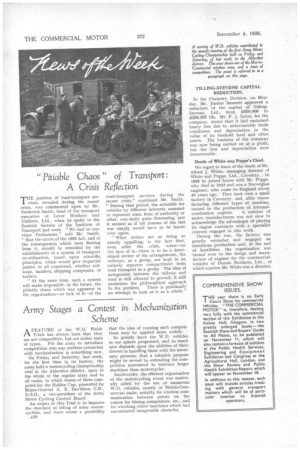"Pitiable Chaos" of Transport: A Crisis Reflection T HE position of
Page 30

If you've noticed an error in this article please click here to report it so we can fix it.
road-transport services, revealed during the recent crisis, was commented upon by Mr. Frederick Smith, head of the transport executive of Lever Brothers and Unilever, Ltd., when he spoke to the Scottish Section of the Institute of Transport last week. "We had to convince Parliament," said Mr. Smith, "that the errors of the 1933 Act, and of the consequences which were flowing from it, should be remedied by the establishment of a system of transport co-ordination, based upon scientific principles, which would give impartial justice to all concerned, whether railways, hauliers, shipping companies, or traders.
"At the same time, such a system will make impossible, in the future, the pitiable chaos which was apparent in the organization—or lack of it—of the road-transport services during the recent crisis," continued Mr. Smith. "During that period, the scramble for vehicles by different interests, assumed to represent some form of authority or other, was really quite distressing, and it seemed as if the lessons of the last war simply would have to be learnt over again.
"What strikes me as being so utterly appalling, is the fact that, even after the crisis, when—on the face of it—there is to be a determined review of the arrangements, the railways, as a group, are kept in an entirely separate compartment from road transport as a group. The idea of antagonism between the railway and road is still allowed to prevail; it still permeates the philosophical approach to the problem. There is practically no attempt to look at it as a whole."




















































































